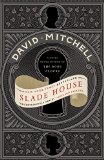Summary | Excerpt | Reviews | Beyond the book | Read-Alikes | Genres & Themes | Author Bio

Stories
by Chris AdrianChris Adrian writes piercing, astonishing, deeply serious stories
that sound utterly ridiculous if you only describe their plots. His second
novel, The Children's Hospital, one of the best novels I've read in the
last five years, is about a hospital that turns into an ark during an
apocalyptic flood and bears its inhabitants towards a new land. How corny is
that? Yet Adrian pulls it off because, though his conviction in his own
fictional world never wavers, he persistently undercuts the ponderousness of his
symbolism with irreverence, and the combination comes off sounding a lot like
wisdom.
Adrian's literary terrain is best categorized as magical realism, in which none
of his characters are surprised when supernatural happenings overtake their
otherwise recognizable world. One story features an angel who begs her human
host to take another hit of heroin, and then turns from a hag into a beautiful
maiden the instant he does. In another story, a little boy's soul disappears
from his body, replaced by a chorus of voices who cry for vengeance for the 9/11
attacks. "We are here because your faithlessness called us to you, and we will
stay until you remedy it with sincerity and sacrifice," the boy changeling
growls. His father makes it macaroni and cheese.
The stories are, without exception, deeply disturbing. Consider, for instance,
"Stab," in which a girl who has lost both parents befriends a boy whose Siamese
twin has just died. Together, they roam the neighborhood at night with a dagger,
murdering pets and woodland creatures. Or "A Child's Book of Sickness and
Death," featuring Cindy, an "ex-twenty-six-week miracle preemie," now eight
years old, lacking most of her intestines, a regular in the pediatric ward, and
the author of a children's book about fantastically diseased animals: "See the
zebra? She has atrocious pancreas oh! Her belly hurts her terribly….Her stripes
have begun to go all the wrong way, and sometimes her own poop follows her,
crawling on the ground or floating in the air, and calls her cruel names.
Suffer, zebra, suffer!" Adrian writes with a macabre, knowing humor that always
drives toward a weighty theological quandary, what you'd get if you crossed the
movie "Harold and Maude" with the novels of Marilynne Robinson.
A Better Angel is a spiritual book that is noteworthy for what it lacks.
There are no gods or saviors here, only a few angels and one very reluctant
antichrist. The characters are inhabited or visited by entities they do not
understand and who rarely strike them as divine. The people of Adrian's stories
seem determined to live ordinary secular lives, despite the miracles that erupt
into the everyday, as when a nineteenth-century farmboy begins seeing visions of
people plummeting from a skyscraper. They don't want to know that the
world contains more than three dimensions, in part because the veil that shields
us from such realms only flutters aside when there is suffering.
If the story collection has a flaw, it is repetition. It comes as no surprise to
learn from interviews that Adrian lost a brother in a car accident fourteen
years ago, because so many of his characters are hollowed out and made
otherworldly by grief, and so many of his stories are wish fulfillments of the
desire to bring back a lost one. Three of the stories are haunted by the specter
of 9/11, a preoccupation which feels somewhat belated in 2008, as if Adrian is
reaching for a bridge between his personal grief and a more universal state of
fallenness.
For all his invocations of a divine realm beyond the known world, Adrian is coy
about his religious beliefs. The title story perhaps offers the best insight
into his perception of human nature. A drug-addled doctor who has conned his way
into the profession also happens to have a pesky angel who has dogged him since
childhood, urging him to be his better self. When his father becomes ill, she
steps up her pleas for him to assume his full godhood. "Just put out your hand
to him and he will be healed," she exhorts. "Just put out your hand to him, and
you will undo all the pain you've caused me." The doctor refuses, and just
before his father dies, he tells him, "I want a better angel, Dad." I venture
that this is Adrian's spiritual worldview, that we are all shadowed by divinity
but disbelieving and dismissive of the power we already have, always wanting
more.
![]() This review was originally published in The BookBrowse Review in September 2008, and has been updated for the
August 2009 edition.
Click here to go to this issue.
This review was originally published in The BookBrowse Review in September 2008, and has been updated for the
August 2009 edition.
Click here to go to this issue.

If you liked A Better Angel, try these:

by Joy Williams
Published 2018
From "quite possibly America's best living writer of short stories" (NPR), Ninety-Nine Stories of God finds Joy Williams reeling between the sublime and the surreal, knocking down the barriers between the workaday and the divine.

by David Mitchell
Published 2016
Keep your eyes peeled for a small black iron door.
Your guide toexceptional books
BookBrowse seeks out and recommends the best in contemporary fiction and nonfiction—books that not only engage and entertain but also deepen our understanding of ourselves and the world around us.